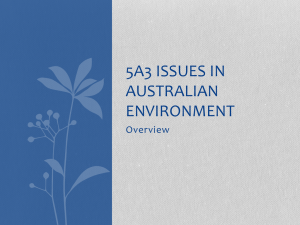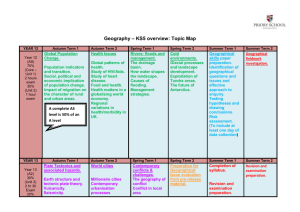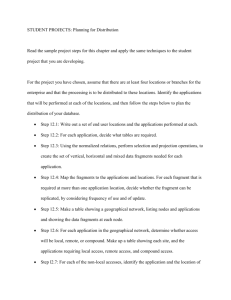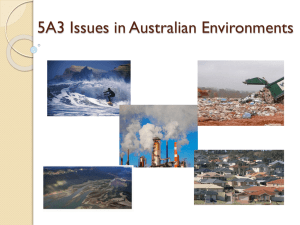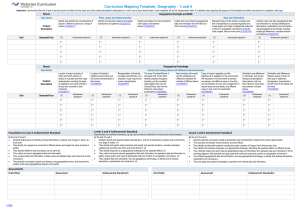Geography ~ Stage 5 Course Outline
advertisement
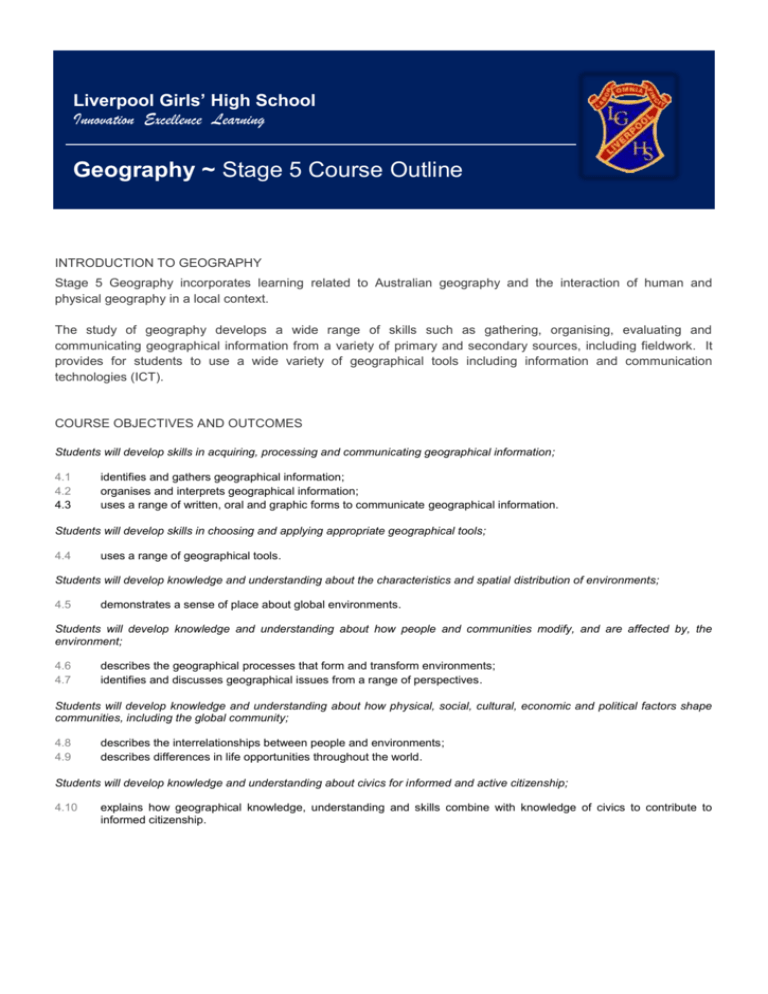
Liverpool Girls’ High School Innovation Excellence Learning Geography ~ Stage 5 Course Outline INTRODUCTION TO GEOGRAPHY Stage 5 Geography incorporates learning related to Australian geography and the interaction of human and physical geography in a local context. The study of geography develops a wide range of skills such as gathering, organising, evaluating and communicating geographical information from a variety of primary and secondary sources, including fieldwork. It provides for students to use a wide variety of geographical tools including information and communication technologies (ICT). COURSE OBJECTIVES AND OUTCOMES Students will develop skills in acquiring, processing and communicating geographical information; 4.1 4.2 4.3 identifies and gathers geographical information; organises and interprets geographical information; uses a range of written, oral and graphic forms to communicate geographical information. Students will develop skills in choosing and applying appropriate geographical tools; 4.4 uses a range of geographical tools. Students will develop knowledge and understanding about the characteristics and spatial distribution of environments; 4.5 demonstrates a sense of place about global environments. Students will develop knowledge and understanding about how people and communities modify, and are affected by, the environment; 4.6 4.7 describes the geographical processes that form and transform environments; identifies and discusses geographical issues from a range of perspectives. Students will develop knowledge and understanding about how physical, social, cultural, economic and political factors shape communities, including the global community; 4.8 4.9 describes the interrelationships between people and environments; describes differences in life opportunities throughout the world. Students will develop knowledge and understanding about civics for informed and active citizenship; 4.10 explains how geographical knowledge, understanding and skills combine with knowledge of civics to contribute to informed citizenship. Stage 5 Geography – Year 9 Semester One Investigating Australia's Physical Environment The unique characteristics of Australia’s physical environments and the responses of people to the challenges they present. Australian advertising campaign Term 1 Week 7 Units of work *Australian continent *Physical characteristics Research/Presentation task-Natural Hazards *Natural Hazards Term 2 Week 3 *Case study on ONE Natural Hazard Year 9 FEED Self assessment, Peer assessment, Teacher observation and Criteria based BACK Semester Two Changing Australian Communities Ways in which communities in Australia are responding to change. Units of work *Demographic characteristics *Types of Australian communities Research ReportAustralia's Demography Term 3 Week 6 Yearly Examination Term 4 Week 1 *Factors causing change *Case Study on ONE Australian community Stage 5 Geography – Year 10 Semester One Issues in Australian Environments Ways which geographical understanding contributes to the sustainable management of issues affecting the Australian environment. Units of work *Geographical issues Coastal Fieldwork Task Skills Report Term 1 Week 10 Term 2 Week 10 *TWO case studies on geographical issues affecting Australian environments Year 10 FEED Self assessment, Peer assessment, Teacher observation and Criteria based Semester Two Australia in its regional and global context Australia in its regional and global contexts and the roles of individuals and groups in planning for a better future. Units of work *Australia place in the world *Australia regional and global links Migrant Interview and analysis End of Course examination * Future challenges for Australia Term 3 Week 8 Term 4 Week 1 *Human rights and reconciliation Geography ~ Performance Descriptors Areas for Assessment Communication Geographical tools and skills Geographical knowledge Grade A A student at this grade typically: displays sophisticated skills to select, gather and organise complex geographical information and uses an extensive range of written, oral and graphic forms to communicate it effectively. exhibits extensive skills to select and proficiently apply geographical tools appropriate to the spatial and ecological dimensions of Australia. demonstrates an extensive sense of place of Australian environments and an extensive understanding of the geographical processes that form and transform them. explains and analyses different perspectives of geographical issues at a range of scales. demonstrates extensive knowledge and understanding of Australian environments and communities, the interactions of people with the environment and the factors that shape communities. displays extensive knowledge of civics and analyses links between civics and informed and active citizenship in relation to geographical issues at a range of scales. Grade B A student at this grade typically: displays high level skills to select, gather, organise and communicate complex geographical information in a broad range of written, oral and graphic forms. exhibits high level skills to select and apply geographical tools appropriate to the spatial and ecological dimensions of Australia. demonstrates a thorough sense of place of Australian environments and a thorough understanding of the geographical processes that form and transform them. explains different perspectives of geographical issues at a range of scales. demonstrates thorough knowledge and understanding of Australian environments and communities, the interactions of people with the environment and the factors that shape communities. displays thorough knowledge of civics and explains links between civics and informed and active citizenship in relation to geographical issues. Grade C A student at this grade typically: displays sound skills to select, gather, organise and communicate geographical information using a range of written, oral and graphic forms. exhibits sound skills to select and apply geographical tools appropriate to the spatial and ecological dimensions of Australia. demonstrates a sound sense of place of Australian environments and adequate understanding of the geographical processes that form and transform them. describes different perspectives of geographical issues. demonstrates sound knowledge and understanding of Australian environments and communities, the interactions of people with the environment and the factors that shape communities. displays broad knowledge of civics and describes links between civics and informed and active citizenship. Grade D A student at this grade typically: displays basic skills to select, gather, organise and communicate geographical information using a range of written, oral and graphic forms. exhibits some skills to select and apply geographical tools appropriate to a range of spatial and ecological dimensions of Australia. demonstrates a basic sense of place of Australian environments and some understanding of the geographical processes that form and transform them. outlines different perspectives of Australian geographical issues. demonstrates basic knowledge and understanding of Australian environments and communities, a range of interactions of people with the environment and a range of factors that shape communities. displays some knowledge of civics and identifies links between civics and citizenship. Grade E A student at this grade typically: displays very limited skills to select, gather, organise and communicate geographical information using a limited range of written, oral and graphic forms. exhibits very limited skills to select and apply geographical tools to some spatial and ecological dimensions of Australia. demonstrates some sense of place of Australian environments and identifies some geographical processes that form and transform them. recognises some different perspectives of geographical issues. demonstrates elementary knowledge and understanding of Australian environments and communities, some interactions of people with the environment and some factors that shape communities. identifies some aspects of civics and recognises some links between civics and citizenship.

